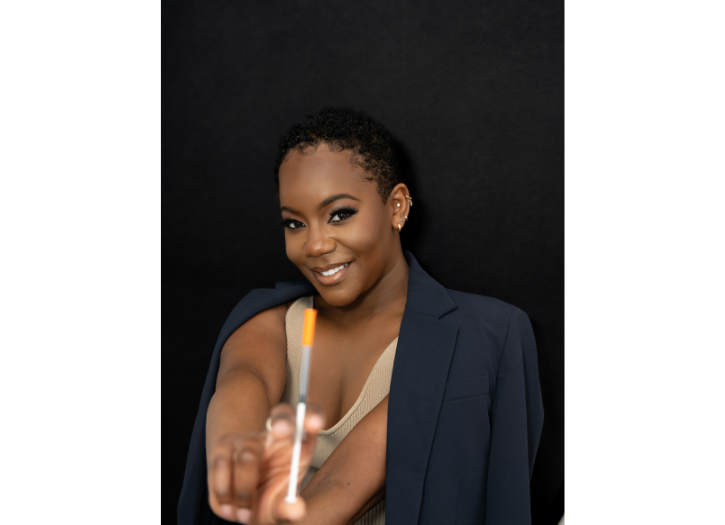Everyone is trying to find the fountain of youth in this social media driven world. We had the opportunity to sit and talk with Romnie Cesar who’s a nurse practitioner and skin expert. She was able to give us tha 411 on healthy ways to keep our skin healthy and youthful!
- Daily Skincare Routine: What are the essential steps in a daily skincare routine (such as cleansing, moisturizing, and applying sunscreen) to maintain healthy, radiant skin? Experts often emphasize cleansing twice daily and using broad-spectrum sunscreen every day to keep skin clean and protected.
Healthy skin begins with a consistent routine. The essentials—cleansing twice daily, moisturizing, and applying an antioxidant before your broad-spectrum sunscreen every morning create a good foundation.
At night, add exfoliating acids and retinoids to your routine to ensure your skin sheds dead skin and keeps a smooth and even surface. Adding a treatment mask or targeted at-home treatment can help address specific concerns. They also offer a beautiful opportunity to infuse self-care into your routine, transforming skincare into a daily ritual you look forward to.
2. Preventative Skin Health: How can I proactively protect my skin from damage and premature aging (from sun exposure, pollution, etc.)? For instance, UV radiation is a leading cause of skin aging, so daily broad-spectrum SPF protection is crucial. In addition, maintaining a healthy lifestyle (diet rich in antioxidants, hydration, exercise, and avoiding smoking/alcohol) helps prevent wrinkles and sunspots.
Proactive skin health is all about prevention and protection. The most critical step is daily use of a broad-spectrum SPF, even on cloudy days, to defend against UV radiation, one of the leading causes of premature aging, fine lines, and sunspots.
A balanced, antioxidant-rich anti-inflammatory diet supports collagen production, fights inflammation, and promotes a healthier, more resilient complexion from within.
Hydration, regular exercise, and avoiding smoking and excessive alcohol improve your overall health and blood circulation. Healthy blood flow delivers essential nutrients and oxygen to your skin, supporting cell renewal and repair.
I also recommend protecting against environmental stressors like pollution by incorporating antioxidant serums like Vitamin C into your daily.
3. Treatments for Common Concerns: What treatments or products do you recommend for common skin issues like acne, dryness, or early signs of aging? For example, salicylic acid cleansers can help acne-prone skin by exfoliating pores, while hyaluronic acid deeply hydratesfine lines. A nurse practitioner can suggest specific topical therapies or procedural options (like chemical peels or laser therapy) based on your concerns.
For acne-prone skin, I often recommend incorporating products formulated with salicylic acid, benzoyl peroxide, niacinamide, and retinoids to help minimize breakouts and support clearer skin. In cases of more severe or persistent acne, prescription treatments may be necessary to achieve clear skin.
For dryness, hyaluronic acid is essential—it draws moisture into the skin, helping to hydrate and plump fine lines. Glycerin is a powerful humectant, attracting water to the skin’s surface. Squalane helps to lock in moisture and strengthen the skin’s protective barrier, leaving it soft, supple, and resilient.
To address signs of aging, I recommend targeted ingredients such as retinoids and peptides, which help stimulate collagen production and improve skin texture for a smoother, more youthful appearance.
For hyperpigmentation, Vitamin C, niacinamide, retinoids, and exfoliating acids like AHAs and BHAs are foundational in brightening skin and promoting even tone. Additionally, ingredients such as kojic acid, azelaic acid, arbutin, licorice root extract, and tranexamic acid offer powerful support in fading dark spots and preventing new pigmentation from forming.
Professional treatments like chemical peels, microneedling, or laser therapy can significantly enhance results in more stubborn cases or for faster results.

4. Product and Ingredient Recommendations: Which active ingredients or product types should I look for (or avoid) given my skin type or concerns? (For example, retinoids or peptides for aging skin, niacinamide for oily/acne-prone skin, gentle cleansers for sensitive skin.) Look for proven ingredients: hyaluronic acid or niacinamide in a non-comedogenic moisturizer for hydration, and antioxidants like vitamin C to brighten skin and protect against damage. An NP can advise on formulations and what to skip (e.g.,harsh scrubs, alcohol-based toners)
A personalized consultation is key to designing the right plan based on your skin’s needs.
For aging skin, look for retinoids to boost cell turnover and peptides to support collagen production.
For oily or acne-prone skin, niacinamide helps regulate oil and calm inflammation. Dry skin benefits from hyaluronic acid and a non-comedogenic moisturizer to hydrate without clogging pores deeply.
If you want to brighten and protect, antioxidants like Vitamin Care excellent for improving skin tone and protecting against environmental damage. For pigmentation, ingredients such as vitamin C, kojic acid, azelaic acid, arbutin, niacinamide, retinoids, and tranexamic acid are key in brightening the skin, evening out tone, and minimizing the appearance of dark spots.
I advise avoiding harsh scrubs, alcohol-based toners, or overly aggressive products that can disrupt the skin barrier.
5. Maintaining Youthful Skin: What long-term strategies and products help keep skin looking youthful and minimize aging signs? This might include using collagen-boosting ingredients (like retinoids) and daily sun protection. Retinoids, for instance, are “among the most researched and effective ingredients for anti-aging,” increasing cell turnover and collagen to reduce lines. A healthy diet and lifestyle (rich in antioxidants, regular exercise) also support skin vitality.
Maintaining youthful skin is less about quick fixes and more about consistent, long-term care. Daily broad-spectrum sun protection and collagen-boosting ingredients like retinoids are essential—they work overtime to increase cell turnover, stimulate collagen, and minimize fine lines. Antioxidants like Vitamin C also help defend against environmental damage and brighten the complexion.
It’s essential to embrace a maintenance mindset regarding skin health. Regular care, a balanced, antioxidant-rich diet, proper hydration, and healthy lifestyle habits all work together to keep the skin resilient and radiant. Starting and stopping treatments frequently or only using products sporadically won’t deliver lasting results; the consistent commitment preserves youthful, healthy skin over time.
It’s equally important to resist the temptation of chasing every new trend or product that hits the market. Proper skin health is built on consistency, personalization, and understanding what your skin truly needs, not what’s popular.
Pairing consistent, clinically proven products with professional treatments creates the ideal environment for your skin to thrive.
6. Professional Treatments: What professional skin treatments (such as facials, chemical peels, laser therapy, microneedling, etc.) do you recommend for improving skin health or specific concerns, and how often should they be done? Professional procedures can enhance at-home care by stimulating collagen and renewing the skin. For example, chemical peels remove dead skin layers and encourage new growth, lasers target deeper layers to reduce pigmentation and boost collagen, and microneedling creates tiny micro-injuries that trigger skin repair. Ask how these can fit into your regimen safely.
Chemical peels are excellent for removing dead skin layers, improving texture, and encouraging fresh, healthy skin growth. Laser therapies can target deeper layers of the skin to reduce pigmentation, refine pores, and stimulate collagen production. Microneedling creates controlled micro-injuries that trigger natural skin repair, improving fine lines, scars, and overall skin resilience. Advanced facials combine medical-grade exfoliation, hydration, and targeted treatments to address concerns such as dullness, congestion, or early signs of aging, while supporting overall skin health and vitality.
With the wide range of aesthetic treatments available today, it’s important to consult a qualified professional who can help identify the most effective options for your specific goals and set realistic expectations for your results.
Treatment frequency depends on the treatment type, skin type, and individual goals. I recommend starting a series of aesthetic treatments spaced about 4 to 6 weeks apart until you reach your desired outcome. Staying consistent with quarterly maintenance afterward helps protect your investment and keeps your skin looking its best year-round. Some more advanced or invasive treatments, such as deeper laser therapies or aggressive resurfacing procedures, are performed less frequently to allow for proper healing and to maximize long-term results.
7. Lifestyle Habits: How do my lifestyle habits (diet, exercise, sleep, hydration, stress) affect my skin, and what changes would you suggest for healthier skin? Research shows factors like balanced nutrition, regular exercise, adequate sleep, and stress management all impact skin. For instance, smoking and high sugar diets can accelerate wrinkles, while hydration and sleep improve the skin’s barrier function. A nurse practitioner can recommend specific lifestyle adjustments (e.g., diet tweaks or exercise routines) to support your skin goals.
Your lifestyle habits are just as crucial to your glow as the products you use. Balanced nutrition, regular exercise, hydration, quality sleep, and stress management support vibrant, healthy skin. In addition to daily habits, staying on top of your overall health through yearly physicals, routine lab work, and incorporating nutritional supplements as needed can help identify and address underlying factors that impact skin health from within.
A diet rich in antioxidants helps protect your collagen, while regular movement boosts circulation and gives your complexion a natural radiance. Lack of sleep, dehydration, and stress can quickly show up as dullness, breakouts, and fine lines.
Even small shifts—like prioritizing sleep, staying hydrated, and managing stress—can transform your skin from the inside out.
Healthy skin starts within. Consistent habits build confident skin.
Photo Credit: Courtesy of Romnie Cesar







Add Comment
You must be logged in to post a comment.